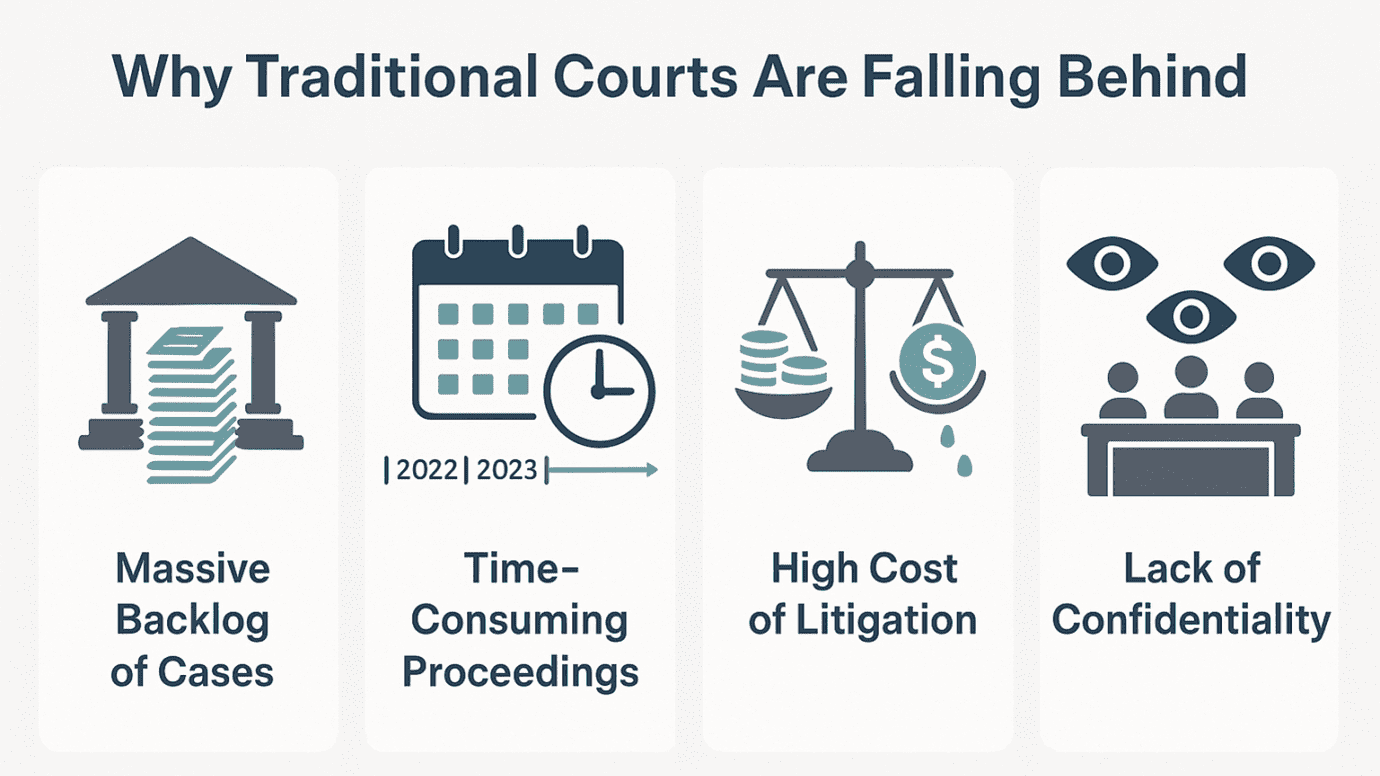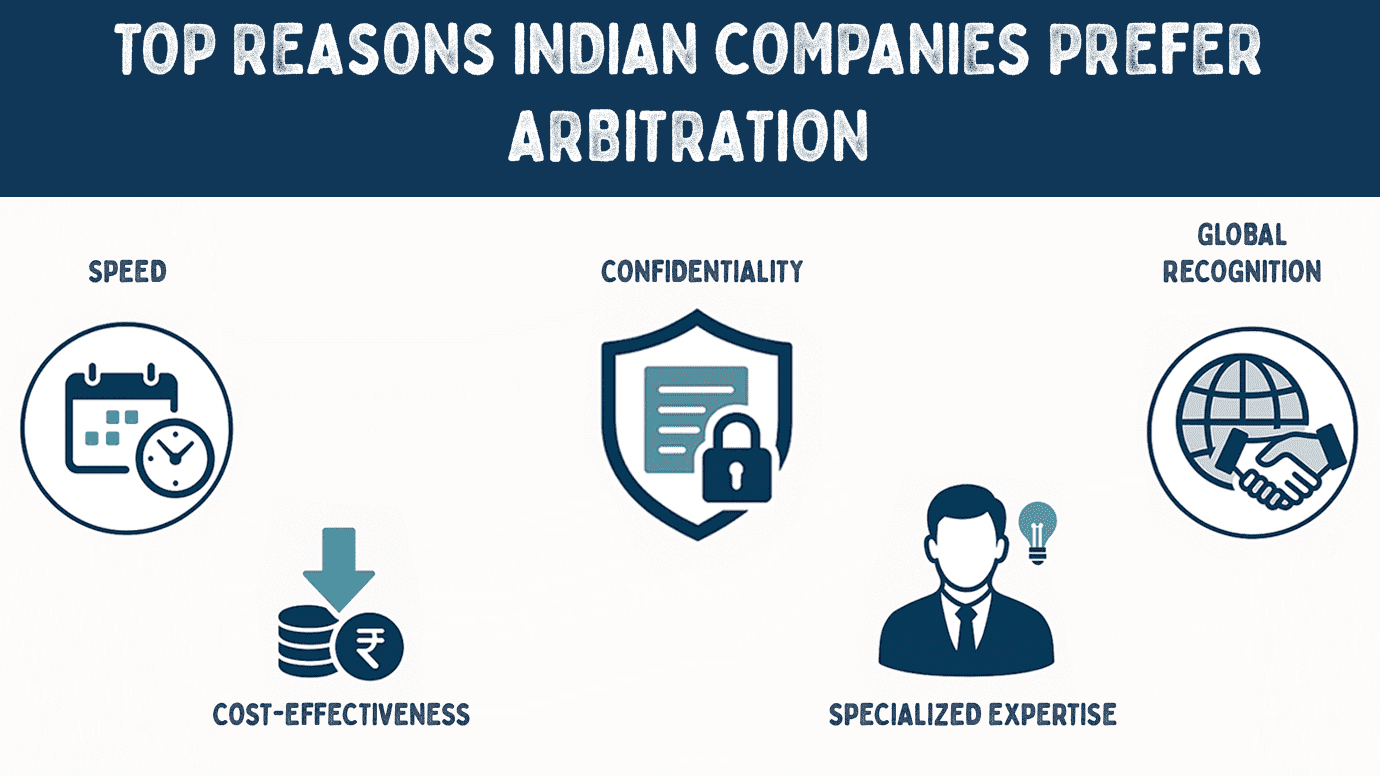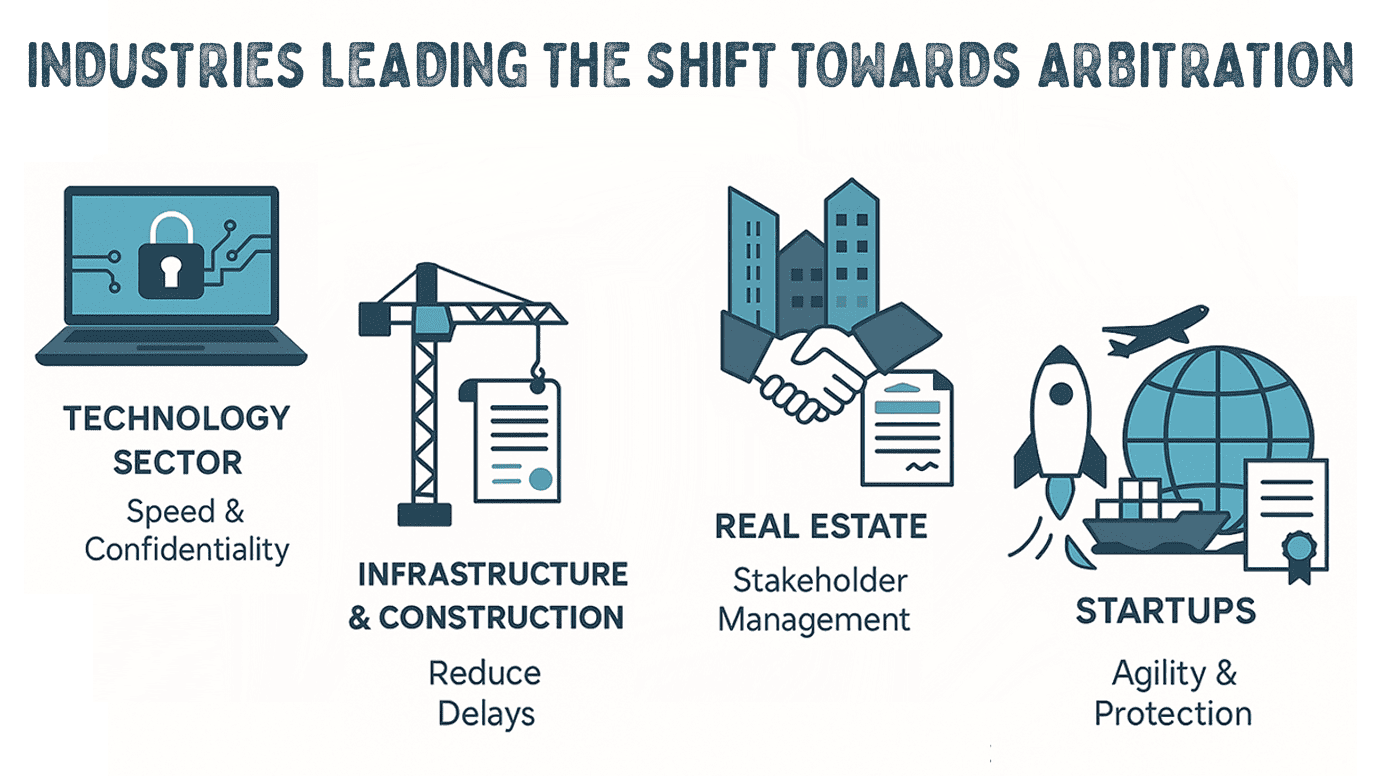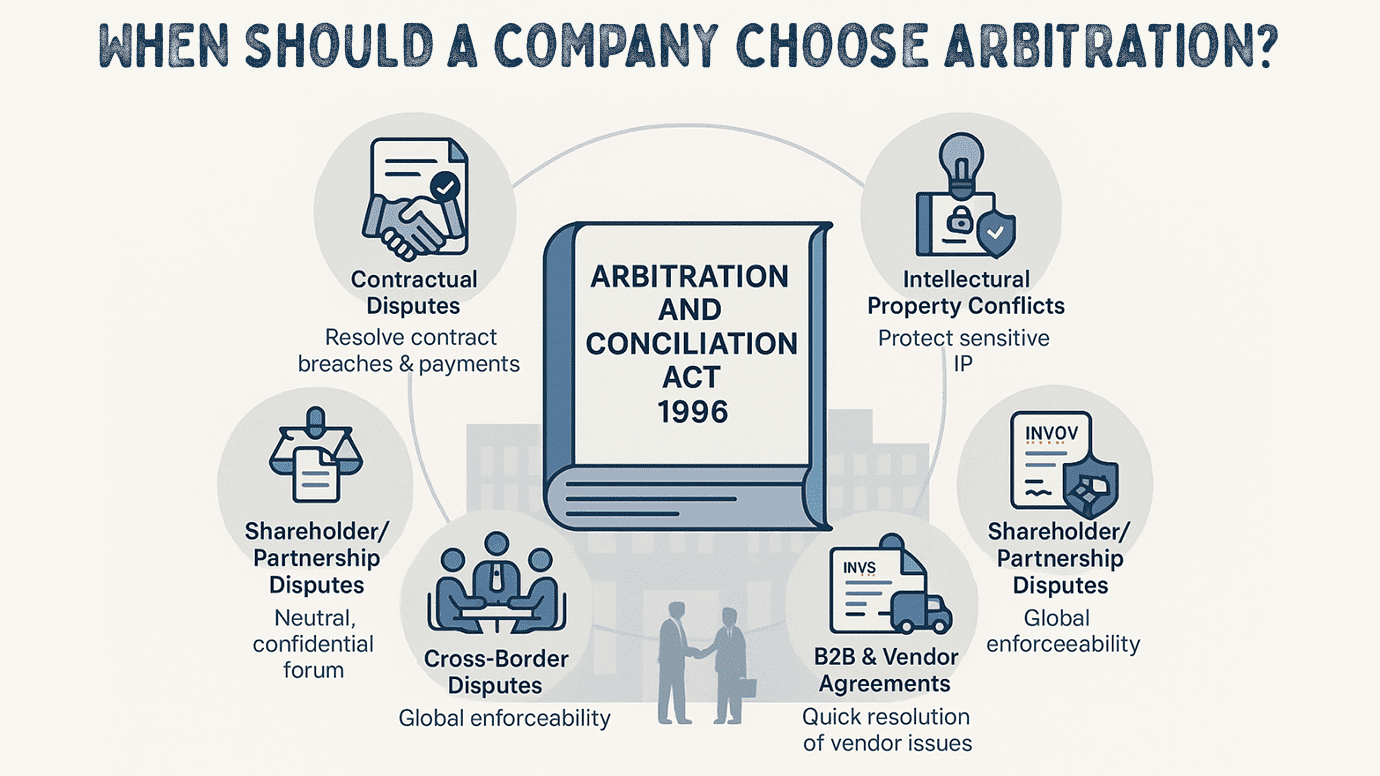Why Indian Companies are Choosing Arbitration over Traditional Courts?
India’s corporate ecosystem is evolving at an unprecedented pace. With the boom in entrepreneurship, foreign investments, and technology-driven enterprises, businesses today are more interconnected than ever. Alongside this growth comes an inevitable rise in commercial disputes, ranging from contractual disagreements to regulatory violations and partnership fallouts.
Traditionally, companies would turn to the courts to resolve such issues. However, the Indian legal system is burdened with a massive backlog of cases, often resulting in long delays and increased legal expenses. As a result, a growing number of Indian companies are embracing alternative dispute resolution mechanisms to settle their corporate disputes swiftly and confidentially.

One such method gaining rapid traction is arbitration in India. Business leaders are increasingly recognizing the benefits of arbitration—faster resolutions, expert adjudication, reduced legal costs, and, most importantly, confidentiality. Unlike courtroom litigation, where proceedings are public and lengthy, the arbitration process in India offers a private, flexible, and efficient route to resolve disputes.
Another driving force behind this shift is the increasing incorporation of the arbitration clause in commercial agreements. Companies now proactively ensure that every major contract includes a clause mandating arbitration as the preferred dispute resolution method. This not only safeguards business interests but also aligns with the legal advancements under the Arbitration Act in India, which has been consistently refined to support a pro-business legal environment.
In today’s competitive business landscape, speed and discretion in resolving conflicts can make or break a company’s momentum. That’s why arbitration has emerged not just as an alternative—but as the smarter, strategic choice for Indian businesses navigating complex commercial challenges.
What is Arbitration?
Arbitration is a widely accepted form of alternative dispute resolution, designed to settle commercial disputes and corporate disputes outside of traditional courtrooms. It is a legally recognized process where the parties to a conflict agree to submit their dispute to one or more arbitral tribunals instead of going through civil litigation.
The arbitration process in India typically begins when both parties—usually through a contract—agree to include an arbitration clause that outlines how potential disputes will be resolved. Once a disagreement arises, the matter is presented before a neutral arbitrator or panel of arbitral tribunals who hear both sides, review the evidence, and issue a binding decision known as an arbitral award.
One of the key benefits of arbitration process in India is that the decisions made by the arbitral tribunals carry the same enforceability as a court judgment. This means that once a verdict is passed, it must be honored by all involved parties, just like a judicial ruling—ensuring finality and legal strength.
It’s important to distinguish between domestic arbitration and international arbitration.
- Domestic arbitration refers to cases where all parties are Indian entities and the dispute arises and is resolved within India.
- International arbitration, on the other hand, involves at least one party that is based outside India or disputes that arise from international commercial agreements. This type of arbitration often comes into play in cross-border transactions, joint ventures, or multinational trade.
The legal framework governing both types is established under the Arbitration Act in India (The Arbitration and Conciliation Act, 1996). This legislation lays out the procedures, powers, and limitations of arbitration, and has undergone several amendments to align Indian arbitration practices with global standards.
In essence, arbitration in India offers businesses a streamlined, professional, and enforceable solution to resolve corporate disputes without the delays and publicity of court battles—making it an ideal choice for companies prioritizing speed, privacy, and control.
Why Traditional Courts Are Falling Behind?
In today’s fast-paced corporate world, businesses need quick, confidential, and cost-effective solutions to resolve commercial disputes. Unfortunately, the traditional court system in India struggles to meet these expectations. Below are the key reasons why companies are shifting away from litigation and turning to arbitration as a smarter alternative:

Massive Backlog of Cases
One of the most critical problems with the Indian legal system is the overwhelming backlog of pending cases. Indian courts are burdened with millions of unresolved matters, many of which have been languishing for years.
- This backlog severely affects the efficiency of the judicial process.
- Even routine corporate disputes can take several years to reach a final verdict.
- Businesses cannot afford to wait indefinitely when operational continuity and investor confidence are at stake.
This persistent court case delay in India is a major driver pushing businesses toward faster dispute resolution options like arbitration.
Time-Consuming Legal Proceedings
The time taken in Indian courts is often disproportionate to the complexity of the case. Litigation involves multiple hearings, procedural delays, adjournments, and documentation requirements, all of which stretch the timeline of a case.
- The average duration for a civil or commercial trial can exceed 5–10 years.
- Such prolonged legal battles not only disrupt business operations but also drain executive focus and resources.
This highlights the clear contrast in arbitration vs litigation in India, where arbitration typically offers a significantly shorter resolution window.
High Cost of Litigation
Another serious challenge is the expensive nature of litigation in India. While legal advice is necessary for any dispute, litigation often becomes financially burdensome due to:
- Extended court timelines leading to prolonged attorney fees
- Repeated court appearances and document filing costs
- Administrative and logistical overheads
For businesses engaged in commercial disputes, these costs can multiply quickly, reducing the appeal of court-based resolution and exposing the disadvantages of litigation.
Lack of Confidentiality
Traditional court proceedings are open to the public, and most case details become a matter of public record. This public nature of court proceedings presents a serious risk to businesses that value confidentiality.
- Sensitive financial data, trade secrets, or internal conflicts may become publicly accessible.
- This can damage reputations, affect share prices, and harm stakeholder relationships.
On the other hand, arbitration proceedings are private, making it the preferred option for companies seeking discretion in corporate dispute management.
The problems with the Indian legal system—including delays, high costs, and a lack of privacy—are increasingly pushing Indian companies to reevaluate their legal strategies. With the growing awareness of the disadvantages of litigation, more and more organizations are adopting arbitration as a faster, more business-friendly solution to resolve commercial disputes.
Top Reasons Indian Companies Prefer Arbitration
With the complexities of modern business increasing, Indian enterprises are moving away from traditional litigation and embracing alternative dispute resolution methods like arbitration. Why? Because arbitration in India offers a smarter, more efficient way to resolve commercial disputes and corporate disputes without compromising time, money, or privacy.

Here’s a breakdown of the top reasons why arbitration has become the preferred choice for Indian companies:
Speed: Quicker Resolution Timelines
Time is one of the most valuable assets in business. Traditional litigation in India can drag on for years due to backlogs and procedural delays. In contrast, the arbitration process in India is designed for speed.
- Most arbitrations are resolved in a matter of months, not years.
- Flexible hearing schedules and streamlined procedures accelerate outcomes.
- Businesses can maintain momentum without being stuck in prolonged court battles.
This fast legal dispute resolution is one of the key benefits of arbitration that appeals to companies across industries.
Cost-Effectiveness: Predictable and Often Lower Legal Costs
Legal expenses can quickly spiral out of control in traditional litigation. However, arbitration for companies tends to be more financially manageable and transparent.
- Fewer procedural formalities reduce administrative and legal costs.
- Parties often agree on arbitrator fees and timelines in advance.
- Reduced need for frequent court appearances or long trials saves money.
For businesses managing tight budgets or multiple legal matters, this cost control is a major advantage.
Confidentiality: Privacy in Sensitive Commercial Matters
One of the most overlooked benefits of arbitration is its private nature. Unlike open court proceedings, arbitration hearings are conducted in a closed environment.
- Details of the corporate dispute remain confidential.
- Sensitive business information, financial records, or trade secrets are protected.
- Reputation management is easier without public exposure.
For any confidential legal dispute in India, arbitration provides peace of mind while preserving business integrity.
Specialized Expertise: Arbitrators with Domain Knowledge
In traditional courts, judges may not always have subject matter expertise in complex commercial areas. But in arbitration, parties can select arbitrators with deep knowledge of their industry.
- Arbitrators often come from legal, financial, or technical backgrounds.
- Their expertise leads to more relevant, informed decisions.
- It reduces misinterpretation of complex contractual or sector-specific issues.
This ensures that corporate disputes are handled with a level of insight and professionalism that court proceedings often lack.
Global Recognition: Enforcement Under the New York Convention
In today’s global business environment, many Indian companies engage in cross-border transactions. For such companies, arbitration in India offers international legitimacy.
- Arbitral awards are enforceable in over 160 countries under the New York Convention.
- This ensures that foreign parties can be held accountable.
- It boosts trust in contracts and international business relationships.
This makes arbitration the ideal choice for resolving commercial disputes in multinational contexts.
Indian companies are choosing arbitration not just for convenience but as a strategic tool for efficient and reliable conflict resolution. The arbitration process in India offers unmatched advantages—fast legal dispute resolution, lower costs, privacy, specialized handling, and international enforceability. These clear benefits of arbitration are why it continues to gain momentum as the preferred method of alternative dispute resolution for today’s forward-thinking businesses.
Industries Leading the Shift Towards Arbitration
As the demand for faster, private, and more flexible conflict resolution rises, several key industries in India are actively embracing arbitration in India as their preferred legal strategy. These sectors are not just adapting to change—they’re driving it. The shift away from courtroom litigation toward alternative dispute resolution is being led by industries where time, confidentiality, and specialization are critical to business success.

Technology Sector: Speed and Confidentiality Are Paramount
In the fast-moving world of tech, innovation often races ahead of regulation. Tech company legal disputes are frequently centered around intellectual property, software licensing, data breaches, and complex service contracts. Traditional litigation simply can’t keep up with the rapid pace of technological change.
- Arbitration offers fast legal dispute resolution that matches the industry’s tempo.
- Tech firms value the confidentiality that arbitration provides in high-stakes IP or cybersecurity matters.
- Inclusion of an arbitration clause in vendor agreements is now standard practice in the sector.
As a result, arbitration has become a cornerstone of conflict management in the Indian tech ecosystem.
Infrastructure and Construction: Reducing Costly Delays
The infrastructure sector deals with high-value, long-term contracts involving multiple stakeholders. Arbitration in construction disputes is not just a trend—it’s a necessity.
- Delays in resolving commercial disputes can stall multi-crore projects and attract penalties.
- Arbitration ensures disputes are settled faster than traditional courts, avoiding long halts in project execution.
- Arbitrators with technical and contractual expertise bring more nuanced, practical resolutions.
Government bodies and private developers alike are adopting alternative dispute resolution clauses to reduce risk and uncertainty.
Real Estate: Managing Complex Stakeholder Agreements
Real estate developers and buyers often face corporate dispute situations related to ownership, delivery, payments, and compliance. With a large volume of contracts and stakeholders involved, clarity and resolution speed are crucial.
- Arbitration ensures matters are kept out of the public eye, preserving brand value.
- Real estate firms benefit from the benefits of arbitration, especially when managing investor or buyer disputes.
- More projects are now embedding arbitration clauses in builder-buyer and joint venture agreements.
Startups: Agility Meets Legal Protection
For startups, time and resources are always limited. Lengthy court cases can cripple a growing business. Arbitration provides startups with:
- A lean, focused resolution mechanism without the burden of traditional litigation.
- The ability to maintain confidentiality in early-stage tech company legal disputes or partner disagreements.
- Access to justice that aligns with their growth model and global aspirations.
The inclusion of arbitration clauses in vendor contracts, partnership deeds, and investment agreements is becoming a best practice for Indian startups.
International Trade and Cross-Border Deals
In global commerce, where Indian businesses frequently collaborate with international partners, arbitration offers a legally recognized and enforceable framework.
- Cross-border commercial disputes can be resolved under international arbitration protocols.
- Indian companies benefit from arbitration in the corporate sector due to the enforceability of awards under global conventions like the New York Convention.
- Arbitration ensures neutrality and fairness, especially when parties hail from different legal systems.
Whether in infrastructure, technology, real estate, or international trade, Indian industries are actively choosing arbitration over litigation. The increased use of the arbitration clause in service and vendor agreements reflects a deeper trust in the system. These sectors are not just using arbitration—they’re proving the real-world benefits of arbitration in the corporate sector.
The Legal Framework Supporting Arbitration in India
As Indian businesses increasingly turn towards alternative dispute resolution, a robust and evolving legal framework is crucial to support and enforce arbitration practices. The cornerstone of this framework is the Arbitration and Conciliation Act, 1996, which governs both domestic arbitration and international arbitration within the country.

Arbitration and Conciliation Act, 1996: The Foundation of Indian Arbitration
The Arbitration and Conciliation Act, 1996 was enacted to align Indian arbitration law with the UNCITRAL Model Law, providing a structured, internationally compatible legal basis for arbitration.
- It outlines the arbitration process in India, from the appointment of arbitral tribunals to the enforcement of arbitral awards.
- The Act empowers parties to customize procedures through mutual agreement, enhancing flexibility.
- It gives legal force to the arbitration clause in contracts, allowing businesses to bypass traditional courts in resolving commercial disputes and corporate disputes.
This legislation has been central to promoting the benefits of arbitration, such as speed, neutrality, and enforceability.
Recent Amendments: Promoting Ease, Speed, and Efficiency
To make arbitration in India more attractive to global investors and local businesses alike, the Act has undergone several progressive amendments in recent years:
- 2015 Amendment: Introduced time limits for the resolution of cases (12 months extendable by 6), directly addressing delay concerns.
- 2019 Amendment: Established the Arbitration Council of India (ACI) to regulate the quality of arbitrators and institutions, enhancing trust and professionalism.
- 2021 Amendment: Strengthened provisions related to the enforcement of awards and provided safeguards against corruption and fraud in arbitration.
These updates make the arbitration act in India one of the more modern and business-friendly legal frameworks globally, further solidifying India’s reputation as a pro-arbitration jurisdiction.
Role of Leading Arbitration Institutions: ICA, SIAC, and LCIA
In addition to legislation, several national and international institutions play a vital role in streamlining and standardizing the arbitration experience:
- Indian Council of Arbitration (ICA): The ICA is one of India’s oldest institutions, offering support for domestic arbitration and industry-specific dispute resolution.
- Singapore International Arbitration Centre (SIAC): Frequently chosen in cross-border contracts involving Indian companies, SIAC is known for efficient handling of international arbitration.
- London Court of International Arbitration (LCIA): Recognized for its neutrality and global standards, LCIA is often preferred in complex corporate disputes involving multiple jurisdictions.
These institutions help enhance the credibility, enforceability, and global appeal of the arbitration process in India.
The legal ecosystem around arbitration in India is both dynamic and increasingly supportive. With a comprehensive statutory base in the Arbitration and Conciliation Act, 1996, regular amendments that prioritize efficiency, and active participation from global institutions like ICA, SIAC, and LCIA, India is rapidly transforming into an alternative dispute resolution hub.
For businesses—whether resolving a domestic arbitration case or navigating a complex international arbitration—the current legal framework offers the assurance of fairness, speed, and enforceability. These are the tangible benefits of arbitration that make it the go-to method for resolving today’s intricate commercial disputes.
When Should a Company Choose Arbitration?
In an increasingly complex and competitive business environment, choosing the right method for resolving legal issues is critical to a company’s success. Many Indian and multinational businesses now view arbitration in India as a strategic tool for efficient conflict resolution. But when exactly should a company opt for arbitration over traditional litigation?

Below, we explore ideal situations for arbitration.
Best Use-Cases for Arbitration
Arbitration is especially effective for specific types of commercial disputes and corporate disputes. Here are the key scenarios where companies greatly benefit from using arbitration:
Contractual Disputes
Most business relationships are governed by contracts. When disagreements arise regarding contract terms, payments, breach of obligations, or service failures, resolving the matter through arbitration is often the best choice.
- A well-drafted arbitration clause in the contract ensures that disputes stay out of court.
- The arbitration process in India allows for customized procedures and faster resolution.
Intellectual Property (IP) Conflicts
Tech companies and startups frequently face issues involving patents, trademarks, or licensing agreements. Arbitration provides the benefits of arbitration such as:
- Privacy in protecting sensitive IP-related information.
- Domain-specific arbitrators who understand complex IP laws.
Shareholder or Partnership Disputes
Internal conflicts among business partners or shareholders can seriously disrupt operations. These corporate disputes are ideal for arbitration because:
- They require a confidential and neutral forum.
- Resolutions can be tailored to preserve the business relationship.
Cross-Border Disputes
For companies engaged in international trade or joint ventures, international arbitration is often more practical than pursuing litigation in foreign courts.
- It offers neutrality and enforceability under the New York Convention.
- Arbitration awards are recognized in over 160 countries, making global enforcement simpler and faster.
B2B and Vendor Agreements
Many service contracts now include a mandatory arbitration clause. For B2B engagements and vendor relationships, arbitration provides:
- Quick redressal of payment disputes.
- Lower costs and limited disruption to business activities.
Knowing when to choose arbitration is as important as understanding its mechanics. The benefits of arbitration—such as speed, privacy, cost-effectiveness, and expert adjudication—make it a highly attractive form of alternative dispute resolution for businesses of all sizes. Whether it’s a domestic arbitration over a vendor contract or a complex international arbitration involving cross-border trade, arbitration offers a powerful path forward in today’s legal landscape.
FAQs
A. Arbitration is a form of alternative dispute resolution where disputes are resolved outside the courts by neutral arbitral tribunals. Unlike traditional litigation, it is faster, private, and more flexible, especially for commercial disputes.
A. Businesses prefer arbitration in India due to its speed, confidentiality, and cost-efficiency. These benefits of arbitration help companies avoid lengthy and public court battles, making it a smarter legal option.
A. Corporate disputes, commercial disputes, partnership disagreements, vendor contract issues, and IP-related conflicts can all be effectively resolved through the arbitration process in India.
A. Yes, under the arbitration and conciliation act 1996, arbitral awards are binding and enforceable by Indian courts, providing legal certainty to the parties involved.
A. An arbitration clause defines how disputes will be resolved, specifying the use of arbitral tribunals instead of courts. It’s a critical part of contracts that enables quicker and private resolutions.
A. Domestic arbitration involves parties within India, while international arbitration includes at least one foreign party or a cross-border transaction. Both are governed under the arbitration act in India.
A. Domestic arbitration involves parties within India, while international arbitration includes at least one foreign party or a cross-border transaction. Both are governed under the arbitration act in India.
A. Absolutely, arbitration in construction disputes is common because it allows project timelines to continue while resolving issues without long court delays.
A. Generally, yes, the arbitration process in India tends to be more cost-effective due to streamlined procedures and shorter timelines compared to litigation.
A. At AdLegal, we offer end-to-end support—from drafting enforceable arbitration clauses to representing clients before arbitral tribunals. Our deep expertise in the arbitration act in India ensures efficient resolution of your commercial disputes.
Conclusion
In the evolving world of commerce, smart businesses are redefining how they manage conflicts and protect their interests. As traditional litigation continues to suffer from delays, high costs, and a lack of confidentiality, companies are increasingly recognizing that arbitration in India offers a more practical, strategic solution. Far from being a temporary trend, alternative dispute resolution is now a core component of modern legal strategy—an essential tool for businesses that prioritize efficiency and long-term stability.
One of the key reasons for this shift is the growing reliance on the arbitration clause in commercial agreements. Whether it’s a domestic arbitration involving local vendors or an international arbitration with global stakeholders, businesses now prefer the speed, neutrality, and enforceability that arbitration guarantees. The benefits of arbitration—including faster decisions, reduced legal costs, and private hearings—are perfectly aligned with the needs of today’s dynamic business environment.
Moreover, the arbitration process in India has matured significantly, supported by a robust legal framework and active arbitral tribunals. Companies facing complex corporate disputes or high-value commercial disputes can now resolve their issues more efficiently without stepping into a courtroom. With global conventions and legal reforms backing arbitration, it has become a future-ready solution that ensures fairness and business continuity.
At AdLegal, we understand the legal challenges businesses face in today’s fast-moving landscape. Our team of arbitration experts is dedicated to helping you navigate every stage of the process—from drafting enforceable arbitration clauses to representing your case before respected arbitral tribunals, whether in India or internationally. We bring clarity, strategy, and peace of mind to every arbitration matter we handle.
If you’re looking to resolve a dispute efficiently, privately, and with legal precision, contact AdLegal today. Let us help you unlock the full potential of alternative dispute resolution and ensure that your business remains agile, protected, and future-ready.
For detailed information about different services provided by us, go to our Services page.



